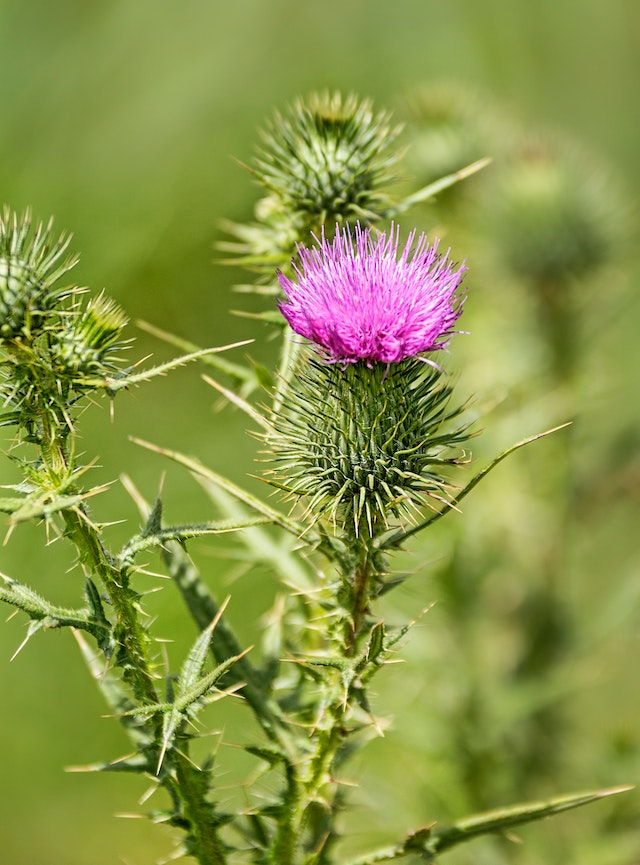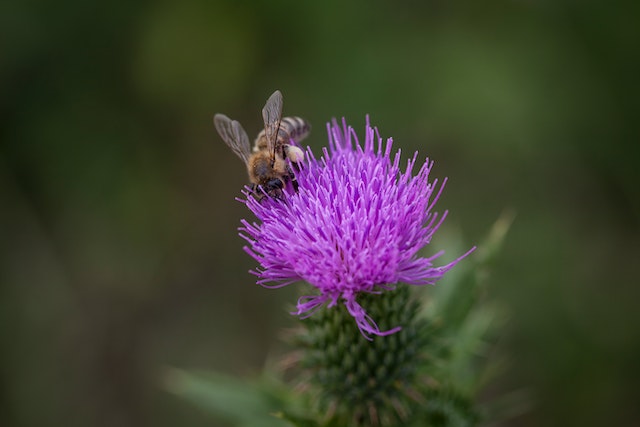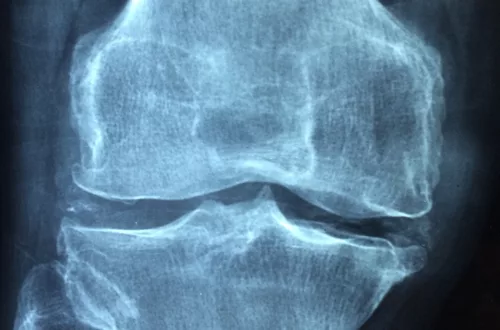Milk Thistle for Endometriosis: Benefits and Usage
Milk thistle is a plant that has been used for centuries in traditional medicine to treat various ailments. Recently, it has gained attention for its potential benefits in treating endometriosis. Endometriosis is a condition where the tissue that normally lines the inside of the uterus grows outside of it, causing pain and discomfort.
Disclaimer: This article is provided for informational purposes only and should not replace professional medical advice. Please consult with a qualified healthcare practitioner or herbalist before using any herbal remedies.
Studies have shown that milk thistle extracts may help reduce the multiplication of endometrial tissue outside of the uterus, and in turn, stop the growth of endometrial lesions. It is believed that milk thistle’s anti-inflammatory and antioxidant properties may be responsible for its potential benefits in treating endometriosis. Additionally, milk thistle may help improve fertility and reduce the risk of ovarian cysts.
While milk thistle may offer potential benefits for those with endometriosis, it is important to note that it should not be used as a substitute for medical treatment. Those interested in trying milk thistle should consult with their healthcare provider to determine if it is safe and appropriate for their individual needs.
Understanding Endometriosis
Endometriosis is a condition where the endometrial tissue, which is the lining of the uterus, grows outside of the uterus. This tissue can grow in various places in the pelvic region, such as on the ovaries, fallopian tubes, bladder, or bowel.
The menstrual cycle plays a significant role in endometriosis. During the menstrual cycle, the lining of the uterus thickens in preparation for a possible pregnancy. If pregnancy does not occur, the lining is shed during menstruation. However, in women with endometriosis, the endometrial tissue that has grown outside of the uterus also responds to hormonal changes during the menstrual cycle. This means that the tissue can also bleed and cause inflammation and scarring in the pelvic region.
Symptoms of endometriosis can vary from person to person. Some women may experience severe pelvic pain, while others may have no symptoms at all. Pelvic pain is a common symptom of endometriosis and can be felt during menstruation or at other times during the menstrual cycle. Some women may also experience lower back pain.
In addition to pelvic pain, endometriosis can also cause infertility issues. The scarring and inflammation caused by endometrial tissue growth can affect the function of the ovaries and fallopian tubes, making it difficult to conceive.
It is important to note that not all women who experience pain during their menstrual cycle have endometriosis. However, if a woman is experiencing persistent pelvic pain or other symptoms of endometriosis, it is important to see a healthcare provider for an evaluation.
In the next section, we will explore how milk thistle may be beneficial for women with endometriosis.
Milk Thistle and its Bioactive Ingredients
Milk thistle (Silybum marianum) is a plant that has been used for centuries as a natural remedy for various ailments. The plant’s seeds contain a bioactive complex known as silymarin, which is believed to have antioxidant and anti-inflammatory properties. Silymarin is the active component of milk thistle extract and is available in the form of milk thistle supplements.
Silymarin is a flavonolignan complex that consists of several bioactive ingredients, including silybin, isosilybin, silychristin, and silydianin. These bioactive ingredients have been shown to have hepatoprotective effects, which means they protect the liver from damage caused by toxins and other harmful substances.
In addition to its hepatoprotective effects, milk thistle has also been studied for its potential benefits in treating endometriosis. The anti-inflammatory properties of silymarin may help reduce the pain and inflammation associated with endometriosis.
Milk thistle is available in various forms, including capsules, tablets, and liquid extracts. The recommended dosage of milk thistle supplements may vary depending on the individual’s age, health status, and other factors. It is important to follow the recommended dosage instructions on the product label and consult a healthcare professional before using milk thistle supplements.
Overall, milk thistle and its bioactive ingredients, particularly silymarin, have shown potential health benefits, including hepatoprotective and anti-inflammatory effects. While more research is needed to determine the effectiveness of milk thistle in treating endometriosis, it may be a natural remedy worth considering for those seeking alternative treatment options.
Milk Thistle for Endometriosis Treatment

Milk Thistle is a natural herb that has been used for centuries to treat various ailments. Recent studies suggest that it may have beneficial anti-inflammatory properties that can help reduce inflammation and oxidative stress associated with endometriosis.
Endometriosis is a painful condition where the tissue that normally lines the inside of the uterus grows outside of it, causing pain and discomfort. Milk Thistle may help to alleviate pain and inflammation associated with endometriosis.
Milk Thistle is available in supplemental form and can be taken orally. The appropriate doses of Milk Thistle for endometriosis treatment are not yet established, but recommended doses for general liver health are between 140-800 mg per day.
It is important to note that Milk Thistle may affect estrogen levels, so women with breast cancer, uterine cancer, ovarian cancer, endometriosis or uterine fibroids should consult with their healthcare provider before taking Milk Thistle. Additionally, if you have diabetes, use Milk Thistle with caution, since the supplement might lower blood sugar.
In conclusion, Milk Thistle may have potential benefits in treating endometriosis by reducing inflammation and oxidative stress. However, more research is needed to determine appropriate doses and long-term effects of Milk Thistle for endometriosis treatment.
Impact on Hormonal Balance
Milk thistle is a popular natural remedy for endometriosis, but its impact on hormonal balance is still unclear. Hormones, especially estrogen and progesterone levels, play a major role in endometriosis. The growth and symptoms of endometriosis are closely related to hormonal fluctuations, particularly excess estrogen levels and low progesterone production.
Studies suggest that milk thistle may help regulate hormonal balance by increasing progesterone production and reducing estrogen dominance. Milk thistle contains phytoestrogens, which are plant-based compounds that mimic the effects of estrogen in the body. However, unlike synthetic estrogen, phytoestrogens are weaker and do not cause the same negative side effects of excess estrogen.
Milk thistle may also help reduce mood swings and other symptoms associated with hormonal imbalances. It has been shown to have a calming effect on the nervous system, which can help alleviate anxiety, depression, and irritability.
However, it is important to note that milk thistle may interfere with hormonal therapy, including birth control pills. It is not recommended to take milk thistle while on any hormonal therapy without consulting a healthcare provider.
In summary, milk thistle may have a positive impact on hormonal balance in individuals with endometriosis by increasing progesterone production and reducing estrogen dominance. However, more research is needed to fully understand its effects on hormonal balance and its potential interactions with hormonal therapy.
Milk Thistle and Immune System

Milk Thistle has been traditionally used to support liver health and detoxification, but recent research suggests that it may also have immune-boosting properties. The active ingredient in Milk Thistle, silymarin, has been shown to have anti-inflammatory effects that may help to modulate the immune response.
The immune system plays a critical role in the development and progression of chronic diseases, including Endometriosis. In women with Endometriosis, the immune system fails to destroy the endometrial tissue that lands outside the uterus, leading to inflammation and pain. By supporting immune function, Milk Thistle may help to reduce inflammation and alleviate Endometriosis symptoms.
One study found that silymarin can enhance immune function by increasing the production of white blood cells, which play a crucial role in fighting infection and disease. Another study found that silymarin can reduce the production of pro-inflammatory cytokines, which are involved in the development of chronic inflammation.
Overall, while more research is needed to fully understand the immune-boosting properties of Milk Thistle, the available evidence suggests that it may be a useful supplement for women with Endometriosis. By supporting immune function and reducing inflammation, Milk Thistle may help to alleviate symptoms and improve overall health.
Potential Side Effects and Allergic Reactions
While milk thistle is generally considered safe for most people, it can cause side effects and allergic reactions in some individuals. Some of the potential side effects of milk thistle include:
- Gastrointestinal issues such as diarrhea, constipation, nausea, vomiting, and abdominal bloating.
- Anorexia or loss of appetite.
- Changes in bowel habits.
- Abdominal fullness or pain.
Moreover, milk thistle can also cause allergic reactions in some people, especially those who are allergic to plants in the same family as milk thistle, such as ragweed, chrysanthemums, marigolds, and daisies. Signs of an allergic reaction to milk thistle may include hives, difficulty breathing, swelling of the face, lips, tongue, or throat.
It is also important to note that milk thistle may interact with certain medications, including blood-thinning medications, diabetes medications, and drugs that are broken down by the liver. Therefore, individuals who are taking any medications should consult with their healthcare provider before taking milk thistle supplements.
Furthermore, milk thistle may not be suitable for individuals with certain medical conditions, including those with a history of endometriosis or uterine fibroids. Pregnant or breastfeeding women should also avoid taking milk thistle supplements due to a lack of safety data.
In summary, while milk thistle is generally safe for most people, it can cause side effects and allergic reactions in some individuals, and may interact with certain medications. Individuals with certain medical conditions or who are taking any medications should consult with their healthcare provider before taking milk thistle supplements.
Interactions with Other Supplements and Medications
Milk thistle may interact with other supplements and medications, potentially reducing their effectiveness or causing harmful side effects. It is important to speak with a healthcare provider before taking milk thistle alongside any other supplements or medications.
Vitamin B
Milk thistle may interact with vitamin B supplements, particularly vitamin B6, by reducing their effectiveness. This is because milk thistle can inhibit the absorption of vitamin B6 in the body. Individuals taking vitamin B supplements should speak with their healthcare provider before taking milk thistle.
Vitamin C
Milk thistle does not appear to interact with vitamin C supplements. However, individuals taking vitamin C supplements should still speak with their healthcare provider before taking milk thistle.
Vitamin D
Milk thistle may interact with vitamin D supplements, particularly by reducing their absorption in the body. Individuals taking vitamin D supplements should speak with their healthcare provider before taking milk thistle.
Vitamin E
Milk thistle does not appear to interact with vitamin E supplements. However, individuals taking vitamin E supplements should still speak with their healthcare provider before taking milk thistle.
B Vitamins
Milk thistle may interact with B vitamin supplements, particularly vitamin B6, by reducing their effectiveness. This is because milk thistle can inhibit the absorption of vitamin B6 in the body. Individuals taking B vitamin supplements should speak with their healthcare provider before taking milk thistle.
Essential Fatty Acids
Milk thistle does not appear to interact with essential fatty acid supplements, such as fish oil. However, individuals taking essential fatty acid supplements should still speak with their healthcare provider before taking milk thistle.
Fish Oil
Milk thistle does not appear to interact with fish oil supplements. However, individuals taking fish oil supplements should still speak with their healthcare provider before taking milk thistle.
Essential Oils
There is limited research on the interaction between milk thistle and essential oils. Individuals taking essential oil supplements should speak with their healthcare provider before taking milk thistle.
Primrose Oil
Milk thistle does not appear to interact with primrose oil supplements. However, individuals taking primrose oil supplements should still speak with their healthcare provider before taking milk thistle.
Dandelion Root
Milk thistle may interact with dandelion root supplements, particularly by reducing their effectiveness. This is because milk thistle can inhibit the absorption of dandelion root in the body. Individuals taking dandelion root supplements should speak with their healthcare provider before taking milk thistle.

Diabetes Medications
Milk thistle may interact with diabetes medications, particularly by reducing their effectiveness. This is because milk thistle can lower blood sugar levels in the body. Individuals taking diabetes medications should speak with their healthcare provider before taking milk thistle.
Dietary Considerations
Dietary considerations can play an important role in managing endometriosis symptoms. While there is no specific diet that can cure endometriosis, incorporating certain foods and avoiding others can help alleviate symptoms.
Green leafy vegetables and cruciferous vegetables, such as broccoli and kale, are rich in antioxidants and anti-inflammatory compounds that can help reduce inflammation and pain associated with endometriosis. These vegetables are also a good source of fiber, which can help regulate bowel movements and reduce bloating.
Sunflower seeds are another food that may be beneficial for endometriosis. They are rich in vitamin E, which has anti-inflammatory properties, and magnesium, which can help alleviate cramps.
In addition to incorporating these foods into their diet, some people with endometriosis may benefit from taking dietary supplements. Milk thistle, for example, has been suggested as a possible supplement for managing endometriosis symptoms. However, more research is needed to determine its effectiveness.
It is also important to avoid certain foods that can exacerbate endometriosis symptoms. Processed foods, which are often high in sugar and unhealthy fats, can cause inflammation and worsen pain. Alcohol and caffeine can also trigger symptoms such as cramps and bloating.
When shopping at grocery stores, it is important to read labels carefully and avoid foods that contain added sugars and unhealthy fats. Choosing whole, unprocessed foods can help reduce inflammation and improve overall health.
Overall, dietary considerations can play an important role in managing endometriosis symptoms. Incorporating anti-inflammatory foods such as green leafy vegetables and cruciferous vegetables, as well as taking dietary supplements such as milk thistle, can help alleviate pain and inflammation. Avoiding processed foods, alcohol, and caffeine can also help reduce symptoms.
Professional Medical Advice
It is important to consult with a healthcare provider or qualified practitioner before using milk thistle or any other supplement for endometriosis. While milk thistle has been traditionally used for various medicinal purposes, including liver and gallbladder issues, there is limited scientific evidence to support its effectiveness for endometriosis.
A healthcare provider or qualified practitioner can assess an individual’s medical history, current medications, and other factors to determine if milk thistle is safe and appropriate for their specific situation. They can also provide guidance on dosages and potential interactions with other medications or supplements.
It is important to note that milk thistle may not be appropriate for everyone. Individuals with certain medical conditions, such as diabetes, breast cancer, uterine cancer, ovarian cancer, endometriosis, or uterine fibroids, may need to avoid milk thistle due to potential interactions or effects on hormone levels.
In addition, milk thistle may cause side effects such as headache, nausea, and diarrhea. It is important to discuss any potential risks and benefits with a healthcare provider or qualified practitioner before using milk thistle for endometriosis or any other health concern.
Further Research and Clinical Trials
While some studies suggest that milk thistle may be beneficial for managing symptoms of endometriosis, more research is needed to fully understand its effectiveness and safety.
Clinical trials are ongoing to investigate the potential benefits of milk thistle for endometriosis. For example, a study is currently underway to assess the effects of milk thistle on pelvic pain and quality of life in women with endometriosis (ClinicalTrials.gov Identifier: NCT04987163).
In addition to clinical trials, systematic reviews and meta-analyses can provide valuable insights into the overall body of research on milk thistle and endometriosis. A recent systematic review found that milk thistle may have anti-inflammatory and antioxidant effects that could be beneficial for managing endometriosis-related pain and inflammation (PMID: 34079430).
Further research is needed to determine the optimal dosage and duration of milk thistle supplementation for managing endometriosis symptoms. It is also important to investigate potential interactions between milk thistle and other medications or supplements that women with endometriosis may be taking.
Overall, while preliminary research suggests that milk thistle may have potential benefits for managing endometriosis symptoms, more rigorous studies are needed to confirm its effectiveness and safety.
Conclusion
Milk thistle is a plant that has been used for centuries in traditional medicine to treat various ailments, including endometriosis. While there is limited research on the effectiveness of milk thistle in treating endometriosis, some studies suggest that it may help to reduce the inflammation and oxidative stress associated with the condition, improve fertility, and reduce the risk of ovarian cysts.
Animal research has shown that milk thistle extracts may reduce the multiplication of endometrial tissue outside of the uterus and stop the growth of endometrial lesions. However, more research is needed to determine if these findings translate to humans.
It is important to note that milk thistle may interact with certain medications, including those used to treat diabetes and high cholesterol. Individuals with breast cancer, uterine cancer, ovarian cancer, endometriosis, or uterine fibroids should also consider avoiding milk thistle.
Overall, while milk thistle may offer some potential benefits for individuals with endometriosis, more research is needed to fully understand its effectiveness and safety. As with any supplement or treatment, individuals should consult with their healthcare provider before using milk thistle to treat endometriosis or any other condition.
References:
Meletis, Chris D., and Nieske Zabriskie. “Natural Approaches to Relieving Endometriosis.” Assay and Drug Development Technologies, vol. 3, no. 2, 2005, pp. 185. Published online: 11 Aug 2005. DOI: 10.1089/act.2005.11.185.
Jiyeon Ham, Jonggun Kim, Fuller W. Bazer, Whasun Lim, Gwonhwa Song. Silibinin-induced endoplasmic reticulum stress and mitochondrial dysfunction suppress growth of endometriotic lesions. Journel of Cellular Physiology. 25 August 2018







